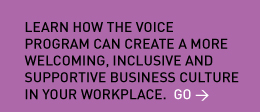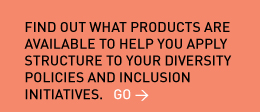The Kokopelli© pictogram comes from various Native American tribal cultures and symbolizes the act of bringing out the best in others. Deb strives to help her clients do just that by working with them to foster diverse and inclusive workplaces where employees can work at their fullest potential.
 Bringing out the best in others is also what colleagues do as part of the VOICE® Program when they become discernible allies for people with disabilities. The familiar wheelchair symbol—seen on parking spaces and accessible restrooms—is most commonly used in connection with disabilities, but it’s problematic for two reasons. It is not inclusive of all people with disabilities because it depicts only impaired mobility. It also reflects a medical view of disability, where the disability is in the person, rather than a social view, where the disability is between the individual and the environment.
Bringing out the best in others is also what colleagues do as part of the VOICE® Program when they become discernible allies for people with disabilities. The familiar wheelchair symbol—seen on parking spaces and accessible restrooms—is most commonly used in connection with disabilities, but it’s problematic for two reasons. It is not inclusive of all people with disabilities because it depicts only impaired mobility. It also reflects a medical view of disability, where the disability is in the person, rather than a social view, where the disability is between the individual and the environment.
Like other under-represented groups in the workplace, people with disabilities want to feel valued and appreciated, not labeled or viewed as less capable. They often must develop resilience and strategies to cope with challenges associated with their condition. Living with a disability often hones skills and values that enrich one’s work life.
People who display the VOICE symbol at work make a conscious commitment to serve as allies for their colleagues who have disabilities.


